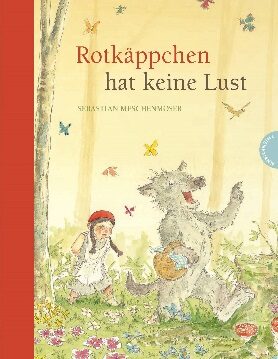Sebastian Meschenmoser
Rotkäppchen hat keine Lust
[Little Red Riding Hood doesn't feel like it]
- Thienemann-Esslinger Verlag
- Stuttgart 2016
- ISBN 978-3-522-45827-6
- 32 Pages
- 3 Suitable for age 4 and above
- Publisher’s contact details
Sample translations
The wolf as the saviour of the story
The reader can tell from her determined gait and irritable look that Little Red Riding Hood is full of anger right from the start - so full, that there’s no room left in her for fear of the wolf. Indeed the dastardly creature himself is somewhat surprised to find things taking a very different turn on this occasion from the one prescribed by the Brothers Grimm in their fairy tale. The wolf therefore begins to take matters into his own hands once he realises to his horror that all the child has in her basket is a brick, a sock and a piece of chewing gum. What can he do to get the story back on track? - He bakes the birthday cake himself, and he picks the flowers for Granny by the forest’s edge.
It quickly becomes apparent that the wolf is the star of this story. On each page Meschenmoser has him exhibit a different demeanour, and these different forms of behaviour then collectively convey a sense of his richly nuanced inner life. Indeed the wolf is used to reflect a whole gallery of emotions: as page follows page we see curiosity, surprise, joy and expectation variously written across his face. We can only be impressed by the way that Sebastian Meschenmoser manages again and again to convey human attributes through the facial expressions of an animal.
The roles enacted in the story are defined anew. This Little Red Riding Hood is no timid little creature: her firm red cheeks, hefty plaits and unforgiving expression indicate that she’s not someone to tangle with. A similar Little Red Riding Hood was offered to us by Nikolaus Heidelbach in his edition of the Grimm brothers’ fairy tales. For Meschenmoser it is the wolf who is the more childlike of the two protagonists, as we can see from the expectant, playful look in his eyes when he first sees Little Red Riding Hood, whereas she with her sturdy stride comes across more as a self-confident adult. Whilst the narrative here is completely self-contained - the wolf and the grandmother end up being more or less a loving couple - children will take even more delight in this book if they are already familar with the original version.
Backgrounds are depicted by Meschenmoser through his delicate use of water colour that proves very pleasing to the eye, with various shades of red exclusively used to delineate the key features, and we are readily captivated by his figurative realism. Given that his book requires us to depart from the traditional paths so familiar to us in fairy tales, we are forced to ask ourselves whether perhaps all stories couldn’t be re-told in completely fresh ways. Meschenmoser’s provocative book seeks to embolden its readers by showing them that it is perfectly legitimate to make use of familiar material in order to play around with it and take it in new directions. It thus falls to Little Red Riding Hood in her role as a temperamental spoilsport to see her own story in new terms. Children of today do experience their grandmothers differently from the way 19th century children did, and the frustrations inherent in this process do need to be spelt out for a change. Viewed in this light, Meschenmoser’s ‘sabotaging’ of the Little Red Riding Hood myth may well encourage readers to find delight in the story all over again.
Translated by John Reddick

By Thomas Linden
Thomas Linden is a journalist (Kölnische Rundschau, WWW.CHOICES.DE) specializing in the areas of literature, theater and film. He also curates exhibitions on photography and picture book illustration.
Publisher's Summary
The wolf is lying in wait in the forest. And he's in luck because before long a little red-hooded girl carrying a basket with presents comes his way. Or rather, she angrily storms past him. She's been told to pay her grandmother a visit and she's in for the most boring afternoon you can imagine! "What have you got in your basket?" purrs the wolf in order to get into conversation with the girl. "A roof tile, a sock and some chewing gum", replies the girl. The wolf is aghast. What a granddaughter! He can't stop himself from teaching the girl how to make the grandmother happy at first …
(Text: Thienemann-Esslinger Verlag)
